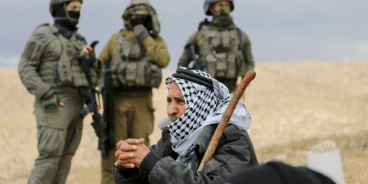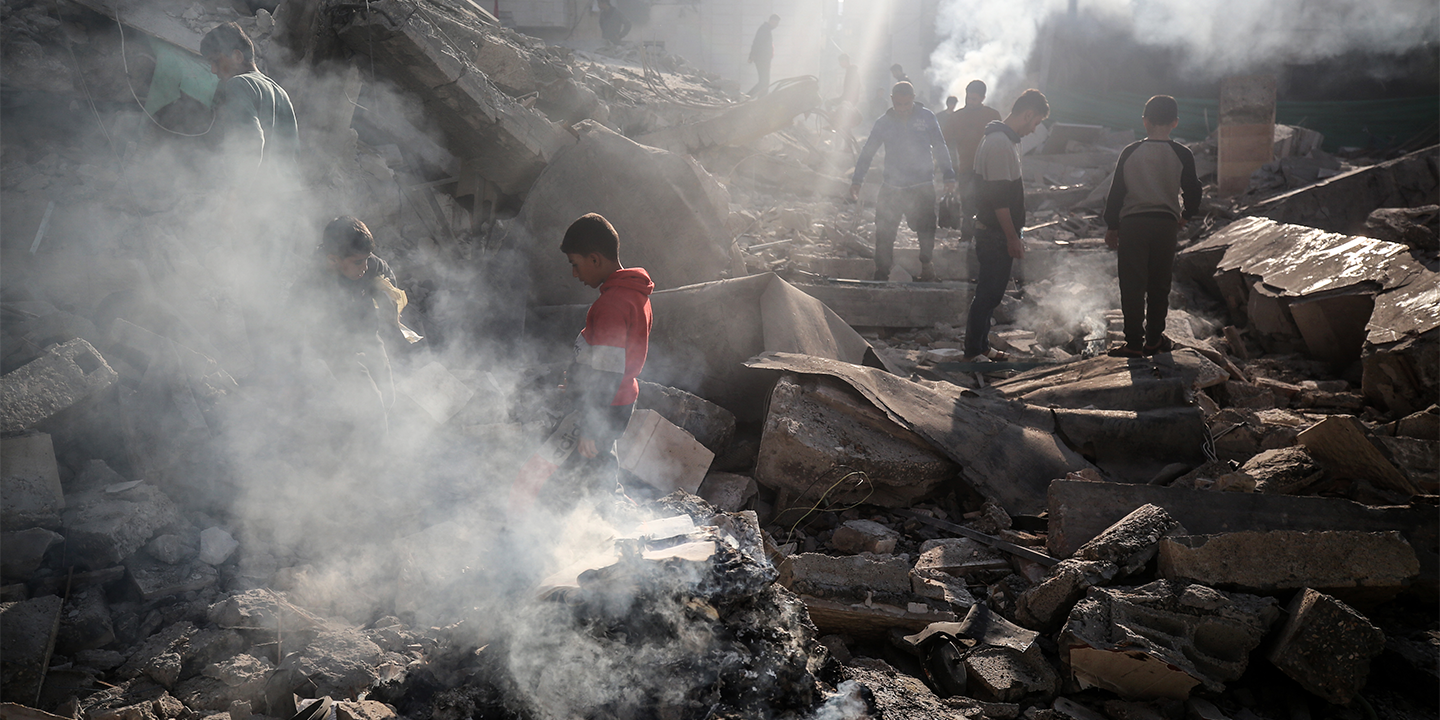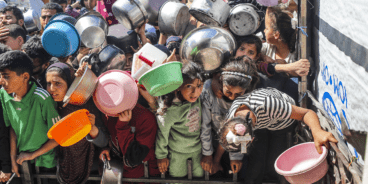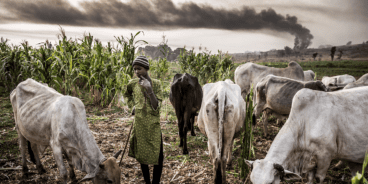

Atrocity Alert No. 376: Israel and the Occupied Palestinian Territory, Nigeria and El Salvador
Atrocity Alert is a weekly publication by the Global Centre for the Responsibility to Protect highlighting situations where populations are at risk of, or are enduring, mass atrocity crimes.
CIVILIANS IN GAZA ENDURE ATROCITIES AND FACE MOUNTING RISKS WITHOUT A CEASEFIRE
Since the resumption of hostilities between Israel and Palestinian armed groups on 1 December, hundreds of Palestinians have been killed every day in Gaza. Israeli bombardments from air, land and sea have continued unabated throughout Gaza, hitting residential buildings, medical facilities, refugee and displacement camps, as well as schools where Palestinian civilians are sheltering. Intense ground operations and fighting between Israeli forces and Palestinian armed groups, as well as the firing of rockets by Palestinian armed groups into Israel, have also continued. Over 18,205 Palestinians in Gaza have been killed since 7 October.
Israeli military operations continue to expand into southern Gaza, an area hosting over 1.1 million Palestinians who were previously forced to evacuate from northern Gaza. The UN has reported that internally displaced persons (IDPs) face extremely overcrowded conditions with no empty space to shelter. Tens of thousands of IDPs have arrived in Rafah since 3 December, following so-called evacuation orders by the Israeli military that designated Rafah as a safe area. Despite this, airstrikes have reportedly targeted residential homes in the western and central parts of Rafah. Independent UN human rights experts have reported that the “ever-expanding evacuation orders” would likely amount to the forcible transfer of a population, a crime against humanity.
Meanwhile in the Occupied West Bank, Palestinians face increasing risks of targeted killings, torture and ill-treatment, arbitrary arrest, mass displacement and forcible transfer as Israeli military operations and settler violence continue to escalate. Over 270 Palestinians have been killed and 3,481 injured in the Occupied West Bank since 7 October.
There is a desperate need for food, water and shelter amidst very limited aid distribution in Gaza. Rafah remains the only area with aid distributions. The intense bombardments and hostilities, as well as restrictions of movement along main access roads, have largely halted the distribution of aid throughout the rest of Gaza. On 7 December UN Under-Secretary-General for Humanitarian Affairs and Emergency Relief Coordinator Martin Griffiths said, “We do not have a humanitarian operation in southern Gaza that can be called by that name anymore.”
In a letter to the UN Security Council (UNSC) on 6 December, Secretary-General António Guterres invoked Article 99 – last explicitly invoked in 1989 – which stipulates that the Secretary-General may inform the Council of matters they believe threaten international peace and security. In doing so, Secretary-General Guterres urged the UNSC to help avert a humanitarian catastrophe. Following this, the UNSC voted on a draft resolution that called for an immediate humanitarian ceasefire, which was vetoed by the United States. During an Emergency Special Session on 12 December, the UN General Assembly overwhelmingly passed a resolution calling for an immediate humanitarian ceasefire. With 153 votes in favor, the resolution demonstrates that there is a growing intolerance among the international community for the ongoing destruction and suffering in Gaza.
Should hostilities continue, civilians will remain at risk of continued likely war crimes and crimes against humanity. The international community must urgently push all parties to agree to a humanitarian ceasefire.
MILITARY AIRSTRIKES KILL AT LEAST 85 CIVILIANS IN KADUNA STATE, NIGERIA
On 5 December at least 85 civilians were killed and dozens severely injured when airstrikes by the Nigerian army struck a religious ceremony in Tudun Biri, Kaduna State. Victims who could not be identified were buried in mass graves. While the government initially claimed the airstrikes were an accident, the army later stated it had observed a group of people and “wrongly analyzed and misinterpreted their pattern of activities to be similar to that of the bandits.”
The Office of the UN High Commissioner for Human Rights (OHCHR) condemned last week’s deadly airstrikes, stating, “We are particularly alarmed by reports that the strike was based on the ‘pattern of activities’ of those at the scene which was wrongly analyzed and misinterpreted. There are serious concerns as to whether so-called ‘pattern of life’ strikes sufficiently comply with international law.” The African Commission on Human and Peoples’ Rights, through its Country Rapporteur on the Situation of Human Rights in Nigeria, stressed that Nigeria, as part of its duty to respect and protect human rights, “has a legal obligation to observe the utmost precautions and care when undertaking such risky military operations.”
Since 2011 recurrent violence between herding and farming communities has escalated in central and north-west Nigeria. Largely in response to these tensions, armed groups and gangs, including so-called “bandits,” have formed and perpetrated widespread abuses, including organized cattle-rustling, kidnapping, plunder, murder and rape. The government has subsequently designated these groups as “terrorists” and intensified military operations in areas where such groups operate.
The Nigerian military has a history of using excessive and abusive force during counterterrorism operations. OHCHR called on the Nigerian authorities to investigate “a string of deadly airstrikes over the past six years.” In 2017 at least 115 civilians were killed following an airstrike on Rann village, Borno State. Over 100 civilians were killed in government airstrikes in December 2022 and January 2023 in Nasawara, Benue and Zamfara states. The UN Special Adviser on the Prevention of Genocide issued a statement in January urging the Nigerian authorities to ensure that counterterrorism operations are conducted in full respect of international human rights and humanitarian law and to conduct an investigation and hold perpetrators accountable. Since then, the Nigerian authorities have provided little information about the airstrikes, and no one has been held to account.
The Nigerian authorities must ensure that independent and transparent investigations are carried out into the circumstances leading to the erroneous airstrike in Kaduna State and hold those responsible to account. The Nigerian army must take immediate steps aimed at improving standard operating procedures and the decision-making involved in the planning and execution of military operations and enhance the protection of civilians. Victims and survivors must be provided with access to justice and receive adequate and effective remedies and compensation.
DEEPENING STATE-LED REPRESSION IN EL SALVADOR RAISES CONCERNS OF ATROCITY RISKS
In a report released on 4 December Amnesty International expressed alarm at El Salvador’s deteriorating human rights situation, warning that President Nayib Bukele’s focus on “highly repressive security and weakening of the rule of law have led the country into one of its worse crises since the end of the internal armed conflict” in 1992. The report identified three main characteristics of the current crisis, including the “massive number of violations and abuses committed, the high degree of state coordination in the design and implementation of this measure and a state response that tends to conceal and minimize these actions, refusing to recognize and diligently investigate these abuses.”
The main victims of abuses are individuals in low-income neighborhoods, particularly those affected by violent crime. Gang violence has been a defining social feature of El Salvador for decades, resulting in an exorbitant number of killings, rape and sexual violence, recruitment of children, abductions and forced displacement of civilians by gang members. Responding to soaring levels of insecurity, security forces have been accused of extrajudicial executions, sexual violence and torture. According to Human Rights Watch, gangs and police were involved in the approximately 13,000 disappearances recorded between 2014-2020 alone, while impunity for past and ongoing violations – including for atrocities committed during the 12-year civil war – remains rampant.
Since taking office in 2019, President Bukele has taken systematic steps to dismantle democratic institutions and impose repressive policies to allegedly curtail gang violence, leaving citizens at heightened risk of abuse by state agents. As Amnesty International noted, the situation demonstrates “a tragic repetition of history, where state violence is gradually replacing gang violence.” Since the imposition of a state of emergency in March 2022, authorities have overseen more than 70,000 detentions, many of which are accompanied by torture and ill-treatment, widespread violation of due process rights and the holding of mass trials of hundreds of individuals. Human rights organizations have also documented more than 320 forced disappearances and at least 190 deaths in state custody as of October 2023. These measures have been accompanied by systematic restrictions on civic space.
Since March 2022, a drop in official homicide rates allowed many citizens to feel a false – yet understandably reassuring – sense of security but pervasive impunity and absence of rule of law have created new serious protection gaps for populations across the country. President Bukele must immediately end state-led repression and engage in a long-term strategy to address gang violence and ensure justice for victims, in line with its obligations under International Human Rights Law. Failure to do so will leave communities in El Salvador in an endless cycle of violence, insecurity and injustice.
Related Content


Gaza: Starvation or Gunfire - This is Not a Humanitarian Response
